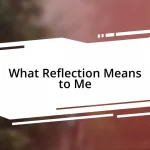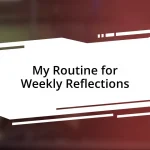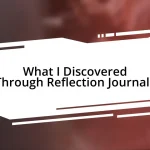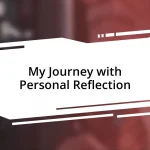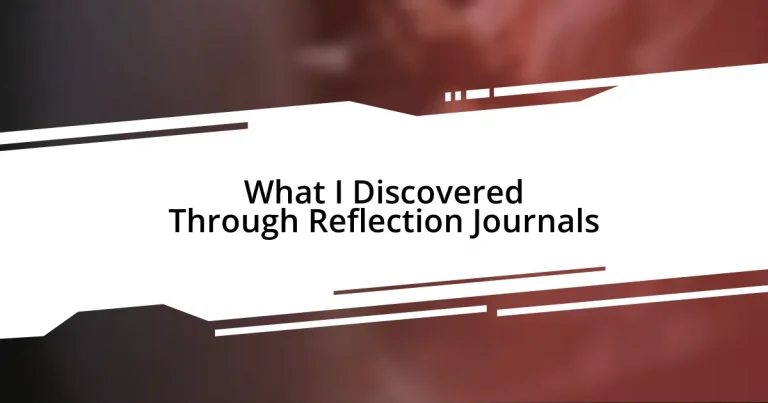Key takeaways:
- Reflection journals aid in personal growth by processing emotions and promoting self-awareness through writing.
- Techniques such as the “Prompt Method,” “Time Capsule Journaling,” and incorporating “Visual Elements” enhance the depth of reflection.
- Analyzing past journal entries reveals patterns and insights that inform present decisions and personal evolution.
- Overcoming challenges like consistency, vulnerability, and self-judgment enhances the journaling experience and fosters deeper self-discovery.
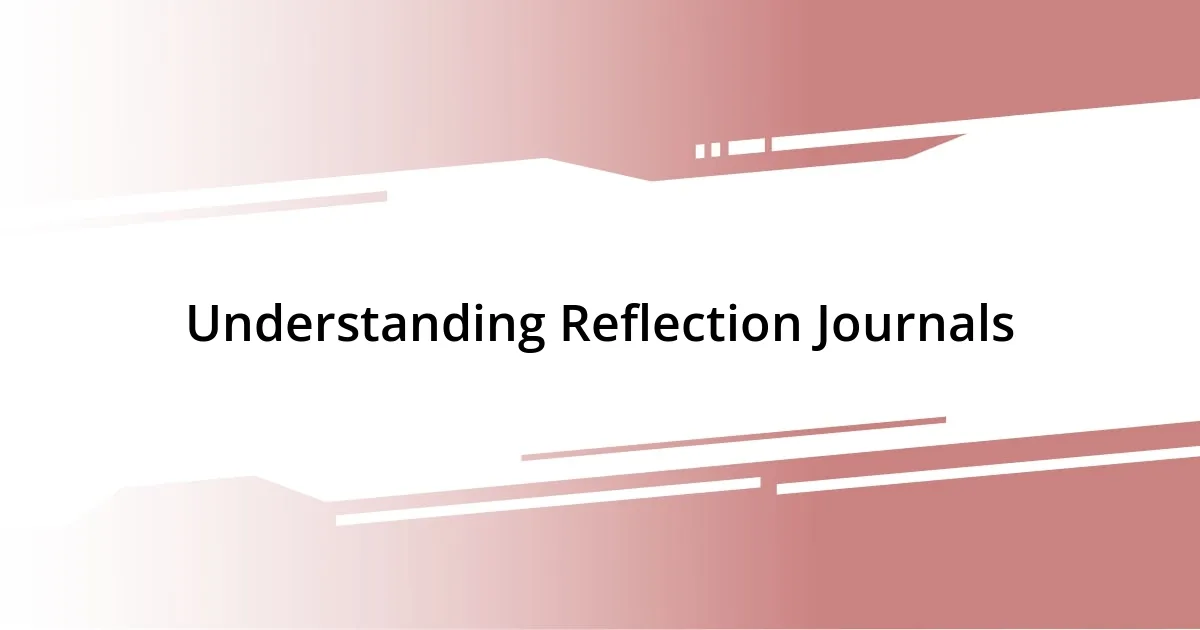
Understanding Reflection Journals
Reflection journals serve as a powerful tool for personal growth and self-discovery. In my own experience, I found that taking a few moments each day to jot down my thoughts helped me process my emotions and experiences in a way that just thinking about them couldn’t. Have you ever felt overwhelmed by your own thoughts? Writing it all down can be incredibly liberating.
The beauty of a reflection journal lies in its flexibility. I remember a time when I was struggling with a big decision; I started free-writing about my feelings and options, and suddenly, the cloud of confusion began to lift. Isn’t it fascinating how our minds can churn with uncertainty until we externalize those thoughts? It’s like holding up a mirror to our inner selves, allowing us to see patterns that we might otherwise overlook.
Moreover, reflection journals encourage accountability. By chronicling not only my successes but also my mistakes, I learned to acknowledge my growth better. Have you noticed how easy it is to forget the lessons learned from past mistakes? Recording those moments in a journal solidifies their importance, turning them into stepping stones rather than stumbling blocks.
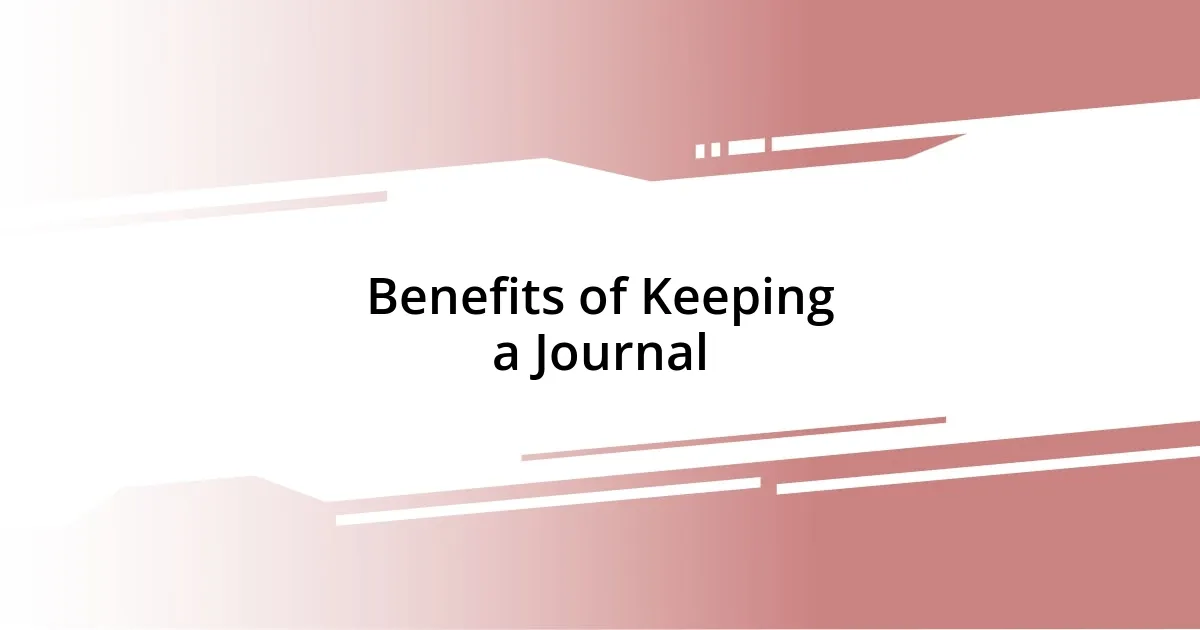
Benefits of Keeping a Journal
One of the most profound benefits of keeping a journal is the clarity it brings to our thoughts and emotions. I remember a particularly chaotic week where it felt like everything was spiraling out of control. When I decided to sit down and write about my feelings, I discovered that many of my worries were tangled together in my mind. By articulating them on paper, I could identify the specific sources of my stress. This clarity helped me devise solutions instead of allowing anxiety to consume me.
Here are some key benefits I’ve found from my journaling practice:
- Enhanced self-awareness: Writing helps in recognizing patterns in our thoughts and behaviors.
- Emotional regulation: It serves as an outlet for processing intense feelings, allowing for emotional healing.
- Improved problem-solving: Journaling enables us to explore different perspectives and brainstorm solutions.
- Increased creativity: The act of writing can spark new ideas, making it easier to think outside the box.
- Stress reduction: Putting pen to paper provides a meditative effect, slowing down the racing mind.
In my experience, I often look back at entries and find insights I didn’t realize I had at the time. This ability to track emotional growth over time is something I truly value.
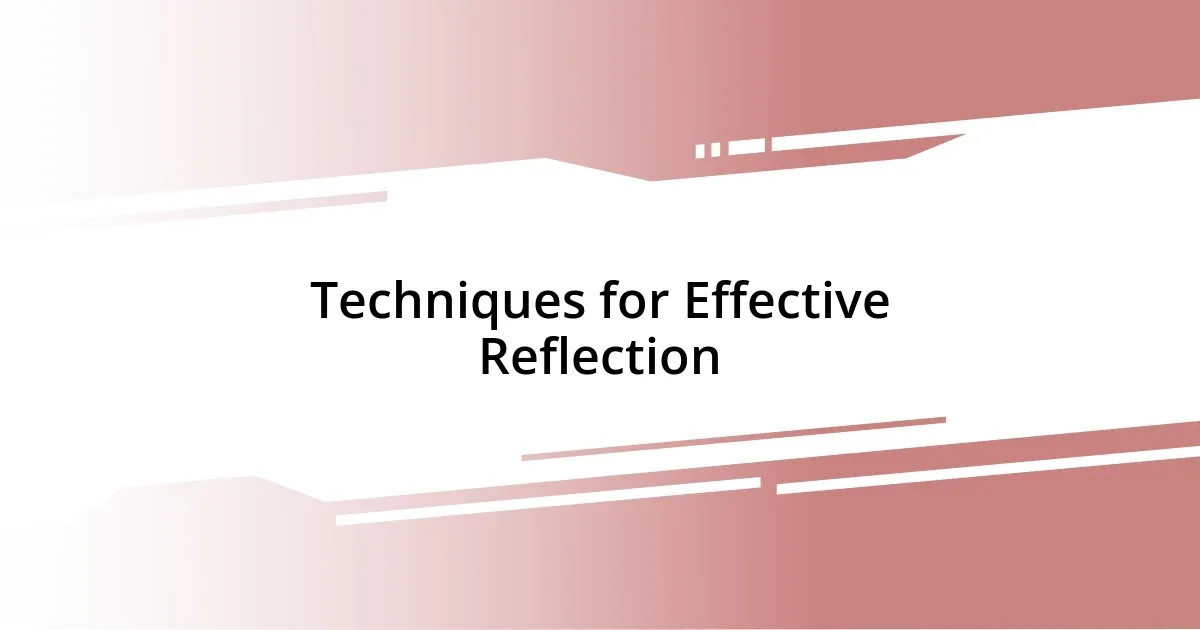
Techniques for Effective Reflection
Reflection can truly transform our understanding of ourselves, and using specific techniques makes the process even more fruitful. One effective approach I’ve discovered is the “Prompt Method.” By selecting a thought-provoking prompt, I find that it pushes me beyond surface-level reflections. For instance, when I used a prompt like “What fear is holding me back?” it opened up a floodgate of realizations that surprised me. Engaging with deeper queries can cultivate an enlightening dialogue within myself that basic journaling seldom achieves.
Another technique worth considering is “Time Capsule Journaling.” I remember one week where I wrote about my life as if I were sending a message to my future self. This technique helped me articulate my current thoughts and feelings more vividly. When I revisited those entries months later, it struck me how much I had evolved. That sense of connection to my past self created a tapestry of understanding about my journey, reinforcing the value of reflecting not just on the present but on my evolution over time.
Finally, incorporating “Visual Elements” into my reflection has added a dynamic layer to my journaling practice. I often draw or use symbols to represent my emotions or situations. This practice of integrating visuals not only makes the act of journaling more engaging but also helps in reinforcing my reflections. The mind can process images differently than words, and allowing this interplay has opened new avenues in my self-exploration. Have you tried mixing artsy elements into your thoughts? It can be a delightful surprise to see your feelings materialize on the page in colorful ways.
| Technique | Description |
|---|---|
| Prompt Method | Using thought-provoking queries to delve deeper into personal insights. |
| Time Capsule Journaling | Writing reflections as if addressing your future self to recognize personal growth. |
| Visual Elements | Incorporating drawings or symbols to enhance emotional exploration. |
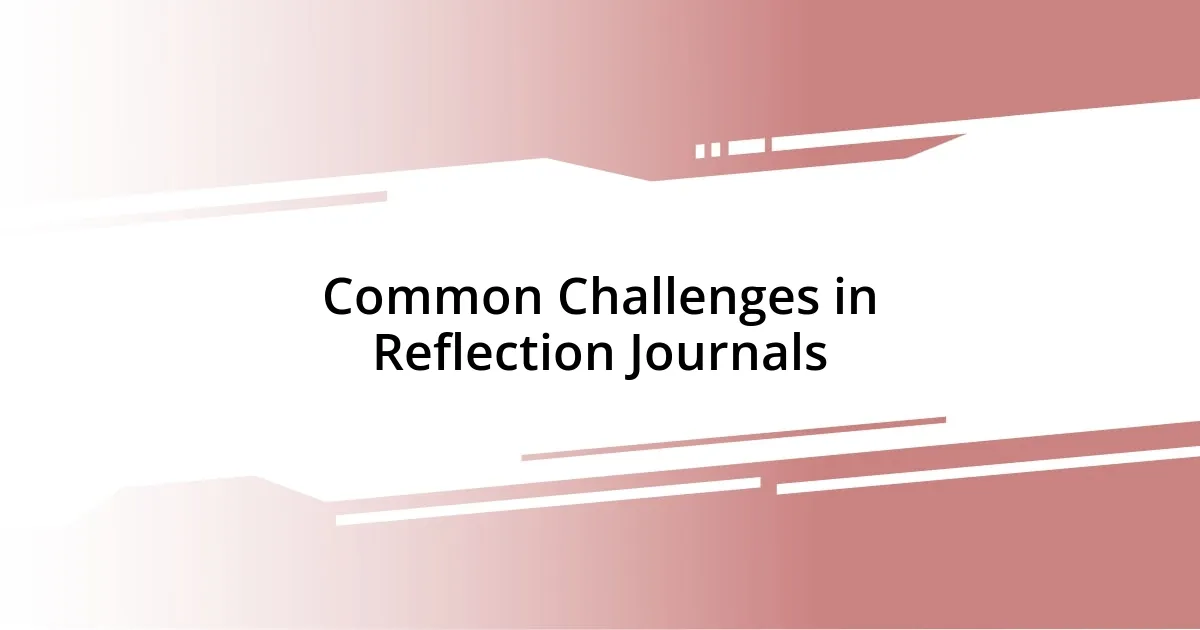
Common Challenges in Reflection Journals
Keeping a reflection journal may sound simple, yet many encounter specific challenges along the way. One common obstacle I faced is consistency. Initially, maintaining a regular writing schedule felt daunting, often leading to guilt when I missed days. I’ve learned that it’s perfectly okay to allow flexible journaling moments. After all, some nights I might not have the energy for lengthy reflections, and just jotting down a few words can suffice. Do you find it hard to stick to a routine too?
Another challenge that may arise is the fear of vulnerability. Writing candidly about my emotions sometimes felt exposing and intimidating. I remember a time when I struggled to articulate feelings of disappointment, worried about what my future self might think. Yet, I’ve discovered that embracing vulnerability ultimately fosters deeper connections with my inner self. Have you ever hesitated to be honest in your writing? It turns out that those raw, unfiltered entries often reveal the truest insights.
Finally, I occasionally grapple with the weight of judgment—both from myself and the potential judgment of others. When I first started journaling, I found myself self-editing too heavily as if my journal was meant for an audience. It took some practice to realize that this reflection space was for me alone, not for anyone else’s scrutiny. Allowing myself the freedom to write without filter has been liberating. Have you faced similar fears that stifled your expression? Over time, embracing this freedom has transformed my journaling experience, allowing me to explore thoughts that I never would have otherwise.
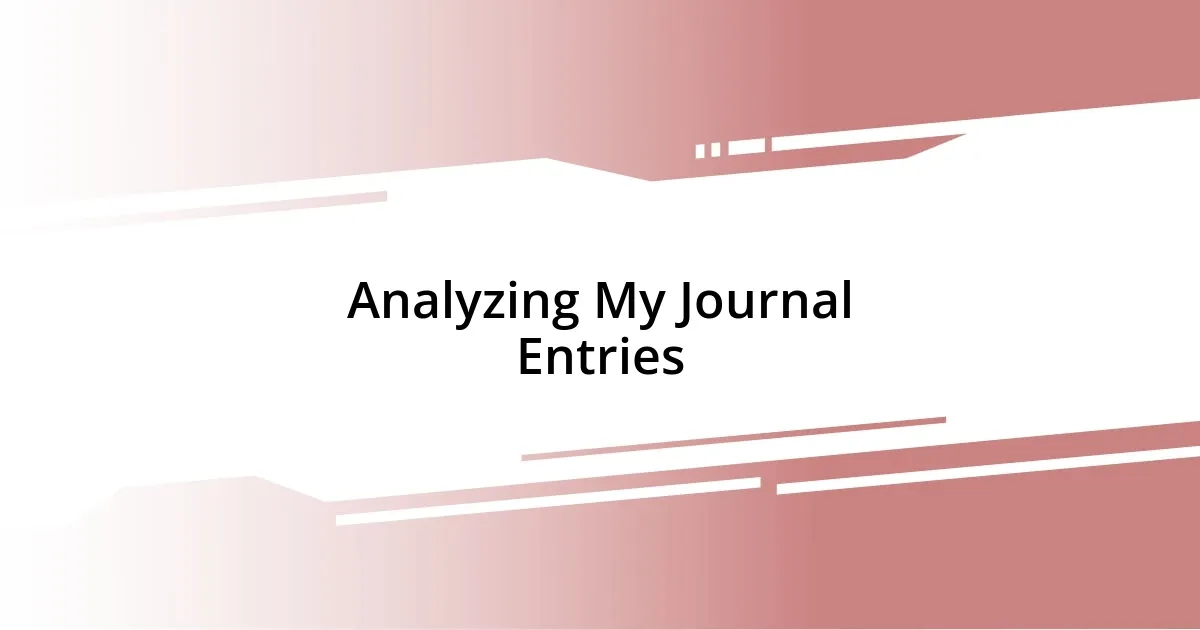
Analyzing My Journal Entries
Analyzing my journal entries has become a fascinating journey of self-discovery. I often look back on them and notice patterns in my thoughts and feelings that I wasn’t aware of at the time. For instance, when I read through an entry about a stressful workweek, I see traces of my anxiety spilling over into other parts of my life—something I missed while I was caught up in the moment. Isn’t it curious how the written word can reveal these hidden connections?
Sometimes, I uncover surprising themes in my entries that reflect my evolving mindset. One week, I found myself writing persistently about a desire for change but felt stuck in my circumstances. It took a few more pages for me to acknowledge that it was my fear of taking action that held me back. Recognizing this was a pivotal moment for me. Have you ever felt that writing might hold the key to unlock something buried within?
As I analyze these reflections, I realize how integral they are to my growth. Each entry serves as a snapshot of where I was emotionally and mentally. Upon revisiting a particularly difficult entry, emotions from that time come rushing back—feeling validated by my past self’s words. It’s this process of reliving my experiences that highlights the importance of journaling: it not only maps my growth but prompts me to ask, “What would my future self want me to learn from this?” Such reflections often guide my decisions today, informing the direction I choose moving forward. Isn’t that a powerful realization?
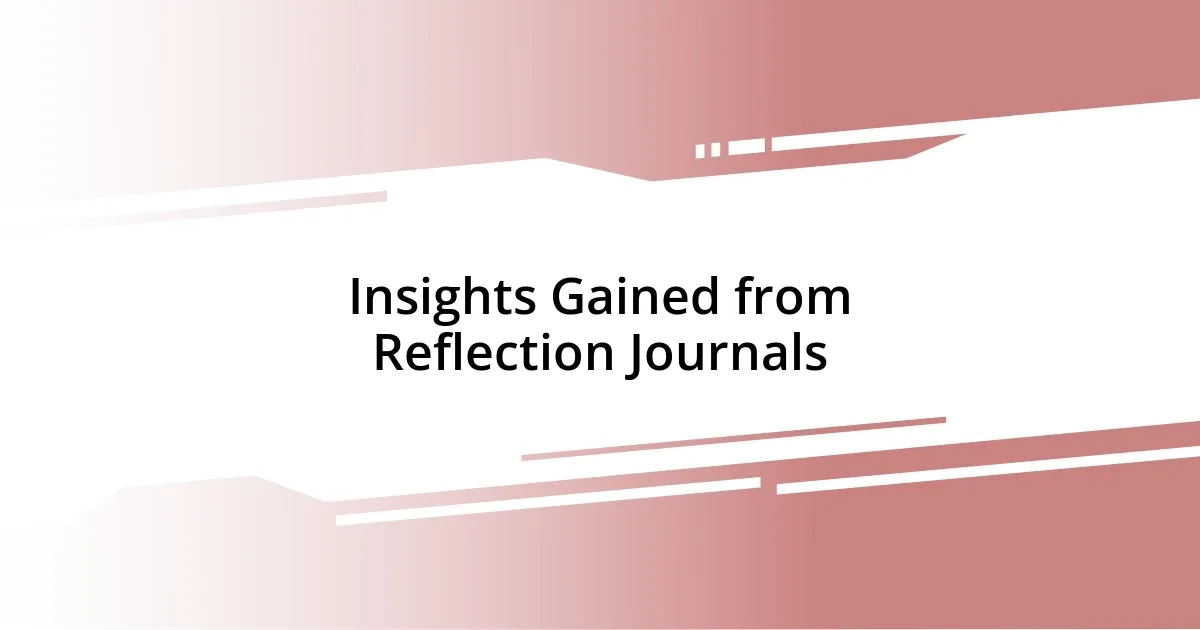
Insights Gained from Reflection Journals
Reflecting on my journal entries has unveiled profound insights I sometimes overlook in daily life. I remember a particularly challenging period where I felt overwhelmed by responsibilities. Upon rereading those entries, I saw a constant theme of self-doubt and the pressure I placed on myself. This revelation was eye-opening; it gave me the perspective I needed to challenge those negative beliefs. Have you ever rediscovered aspects of yourself through past writings that shifted your view in the present?
There are moments when I stumble upon entries that articulate aspirations I had almost forgotten. One entry detailed a passionate dream of starting a personal project that I pushed aside due to fear of failure. Revisiting that ambition reignited a spark, prompting me to take small, actionable steps toward it. Isn’t it fascinating how our past selves can offer guidance and encouragement in surprising ways? It’s these reflections that remind me of the importance of keeping dreams alive.
Emotional insight often comes from simple moments recorded on paper. I distinctly recall a day when I wrote a stream-of-consciousness piece about feeling disconnected. What surprised me during my review of that entry was how articulating my feelings helped me connect with a close friend who shared similar experiences. This realization solidified my belief that sharing our vulnerabilities can foster community. Have you found your reflections bridging gaps between you and others? Understanding that connection has reshaped my approach to journaling, now viewing it not just as self-discovery but as a path to build deeper relationships.






